GAGGA at COP29 #WeWomenAreWater: A global call for
gender-just climate finance
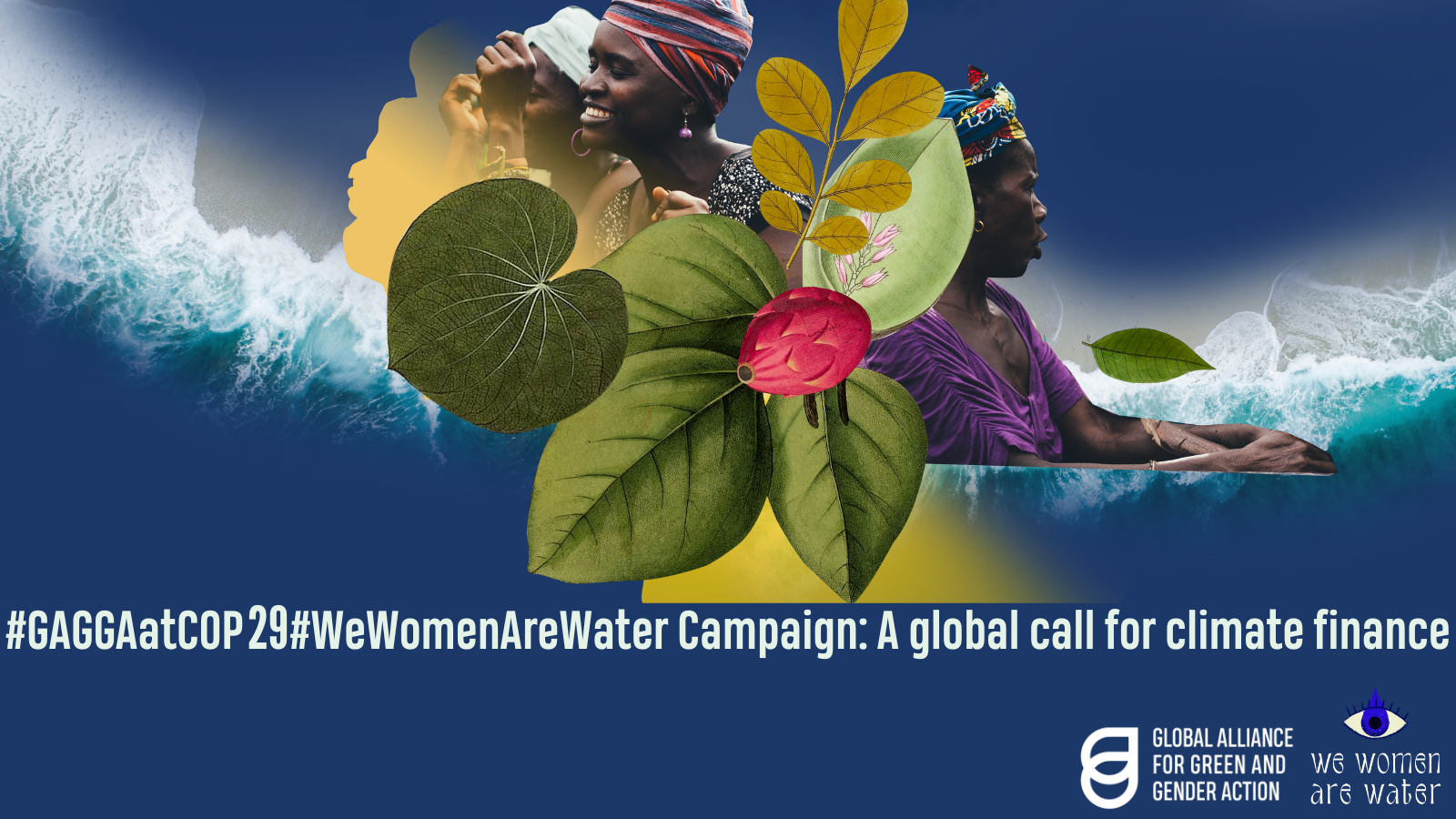
As the world gathers at COP29 in Baku, Azerbaijan from November 11-22, 2024, the stakes for climate justice have never been higher. Climate finance must be radically redirected toward the grassroots movements that are already leading the way with solutions that prioritize gender justice. Women, girls, trans, intersex, and non-binary people from marginalized communities as well as rural, Indigenous, Black and Afro-descendent communities and youth across the world are at the forefront of these climate actions. Yet, despite their impact, they remain largely underfunded and excluded from key decision-making spaces.
The #GAGGAatCOP29 #WeWomenAreWater campaign is a powerful call to amplify the voices of these women frontline defenders and demand that climate finance is restructured to meet their needs.
Launching GAGGA’s new website: Documenting gender just climate solutions
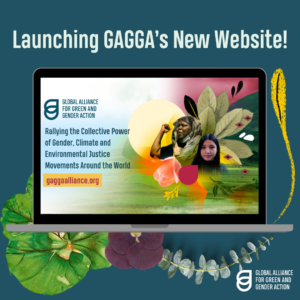
We are thrilled to announce the launch of GAGGA’s brand-new website as part of the #GAGGAatCOP29 #WeWomenAreWater campaign! This isn’t just a website—it’s a documentation of global action where gender, climate, and environmental justice come together in real, transformative ways. At the heart of this new platform lies our interactive map, a living documentation of over 50 gender-just climate solutions developed by GAGGA partners worldwide.
The interactive map highlights the powerful, gender-just climate solutions that are mitigating and adapting to climate change by tackling the root causes of inequality. These solutions, spearheaded by women, girls, trans, intersex, and non-binary people from diverse regions, are building sustainable futures while addressing some of the most pressing challenges of our time.
How the interactive map showcases the evidence of impactful gender just climate action
The interactive map and the case studies showcase concrete evidence that when climate finance is directed toward environmental justice and women’s rights movements, it generates lasting and transformative impact. It amplifies the demand that funders and policymakers need to shift investments away from false solutions like large-scale hydropower and biomass, and into the hands of the communities who are already driving real, sustainable change. The map also enables collaboration, linking GAGGA partners across regions and sectors to strengthen collective action on critical issues such as agroecology, land rights, and gender-just climate finance.
But that’s not all—our new website follows WCAG (Web Content Accessibility Guidelines) and is designed to be accessible, user-friendly, and is available in three languages (English, Spanish, and French). We’ve made it easier than ever for you to find resources, connect with our partners, and learn about the transformative work happening around the globe. From documented case studies to thematic areas of collaboration, the website is a one-stop resource for anyone looking to engage in the intersection of climate, environmental and gender justice
🌱 Discover the map here: bit.ly/GAGGA_InteractiveMap
Spotlighting 4 documented case studies of gender-just climate solutions
As part of the #GAGGAatCOP29 #WeWomenAreWater campaign, we are proud to highlight three documented case studies of gender-just climate solutions developed by GAGGA partners. These case studies, supported by the GAGGA Autonomy and Resilience Fund (ARF) and funded by the Dutch Postcode Lottery, showcase the impact of locally-led gender just climate solutions. Each case offers a compelling example of how gender equality, climate action, and environmental justice intersect to create lasting change.
- Women’s Empowerment Center (WEC) (Nepal): Restoring Ecosystems Through Analog Forestry
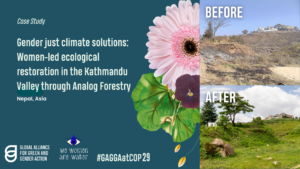
In Nepal, the Women’s Empowerment Center (WEC) is leading a community-based movement to regenerate degraded lands through Analog Forestry. By employing this ecologically sustainable approach, WEC is not only healing the land but also supporting women to take ownership of their environment. Their work is building climate resilience by bringing back biodiversity and improving livelihoods for local communities. WEC’s leadership is a powerful example of gender just locally-led adaptation - AMIR (Honduras): Lenca Women Reclaiming Their Land Through Agroecology
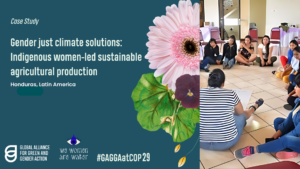
In Honduras, AMIR (Asociación de Mujeres Intibucanas Renovadas) is spearheading a movement led by Indigenous women of the Lenca community, reclaiming their ancestral lands and restoring ecosystems through agroecology. AMIR’s work focuses on regenerating local ecosystems while securing food sovereignty and resisting environmental exploitation. The project is a powerful reminder that locally-led, gender just climate solutions are critical to both fighting climate change and addressing systemic inequalities that affect Indigenous communities. - Mbiame Village (Cameroon): Women-led ecological restoration
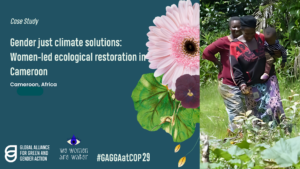
In the montane grassland of Mbiame Village, in northwest Cameroon, women are using Analog Forestry to restore degraded ecosystems, while strengthening their health and livelihoods through sustainable food production. The approach values ecological sustainability while recognising local rural communities’ social and economic needs, which can be met through the production of a diversity of useful and marketable goods and services, such as food, natural medicines, fuel and fodder. - Aadhimalai collective (India): Sustainable management of the Nilgiri Biosphere Reserve
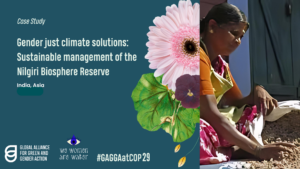
The Aadhimalai Pazhangudiyanar Producer Company is a collective of Adivasi (Indigenous) farmer-producers in the Nilgiri Biosphere Reserve, a tropical forest biome in India that is rich in biodiversity. As part of Aadhimalai, small-scale Adivasi agriculturists and forest gatherers, especially women, are ensuring sustainable management of the biosphere. The Aadhimalai collective, incubated in 2013 with support of GAGGA partner Keystone Foundation, involves 2,000 Adivasi families who are contributing to climate change mitigation by protecting the forest and native species while strengthening their resilience and livelihoods through the sustainable use and sale of non-timber forest products (NTFPs).
Amplify on social media: GAGGA’s COP29 Toolkit
Use this GAGG Aat COP29 #WeWomenAreWater campaign toolkit to support and amplify the documented case studies, the interactive map, and champion our demands. We believe in the power of collective action, and with this toolkit, we invite you to be a part of this movement.
GAGGA at COP29: Side Events and Amplifying Grassroots Voices
GAGGA’s participation at COP29 includes three critical side events that will highlight gender-just climate finance, locally-led adaptation, and the role of grassroots women-led movements in shaping sustainable climate policy.
- November 15th: “Locally-Led Adaptation as a Means to Achieve Gender-Just Climate Finance and Policy”

- Happening in partnership with the Foreign, Commonwealth and Development Office (FCDO), Government of UK, in the UK Pavillion
- Time: 12:50 PM GMT+4
- This side event will focus on how grassroots solutions can inform global policy, particularly in redirecting climate finance toward community-led initiatives.
- Register here.
- November 16th: Roots Rising Campaign Event
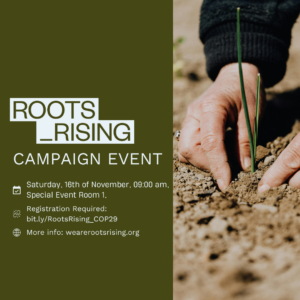
- Happening as part of the Roots Rising Campaign
- Time: 9:00 AM GMT+4
- Invite only
- November 21st: “Locally-Led Adaptation for Gender-Just Climate Finance”

- Happening in collaboration with Prakriti Resources Centre and Indigenous Information Network
- Time: 4:45 PM GMT+4
- This official COP29 side event will highlight Indigenous women and grassroots leaders shaping climate finance to ensure it truly serves the most vulnerable communities in conversation with policy makers.
- Register here.
Defending the Defenders: Voices From The GAGGA Network
In early 2024, GAGGA convened a global meeting, bringing together Women Environmental Human Rights Defenders from diverse regions—Asia and the Pacific, Africa, Europe, and Latin America. The heart of the meeting was to build collective strategies for the unique challenges faced by Women Environmental Human Rights Defenders (WEHRD) across different contexts, and the critical need for a more inclusive, flexible, and safe funding landscape for their work and security.
this series of videos presents a conversation with some of those Women Environmental Human Rights Defenders and their support system, featuring:
- Mimi Ishan, Urgent Action Fund – Africa, Nigeria
- Adolphina Kum, Komunitas Peduli Lingkungan –LEPEMAWI, Timika, Indonesia
- Anonymous (for safety concerns), Brazil
- Deborah Sabará Alves da Silva, Grupo Orgulho, Liberdade e Dignidade – GOLD, Brazil
- Jovita Tzul, Instituto Amaq, Guatemala
Through their powerful testimonies, this series of videos aims to shine a light on the lived realities and resilience of these defenders, emphasizing the need for a transformation in the current structure of climate finance. The defenders provide specific suggestions for funders on why and how to redirect climate finance to support their critical roles effectively. They argue for a rethought structure of climate finance that should be moved away from resourcing false climate solutions to redirect it to women’s funds and environmental justice funds, who have awareness of the broader feminist funding ecosystem and ensure Women Environmental Human Rights Defenders working across different issues and in different contexts are protected, well-resourced and able to access the funding to carry out their work. By providing core, flexible, predictable, long-term funding, women’s funds and environmental justice funds are ideally placed to support such multi-sector work.
Each interview not only shares personal stories of courage and commitment but also critically examines how current funding mechanisms fall short. Only 2.4% of all climate-related development assistance is dedicated to gender equality as the “principal” objective, and within that, only 0.22% of overall ODA for climate change and gender equality goes to women’s rights organizations. In the case of philanthropic funding, of the total amount of philanthropic giving estimated to be allocated to climate-related issues, only 3% directly supports women’s environmental activism. The defenders articulate a clear message to funders: to realize true gender, climate, and environmental justice, support must extend beyond traditional paradigms and adapt to the genuine needs of those at the environmental frontlines – Women Environmental Human Rights Defenders.
Attending COP29 in-person? Connect with us!
Interested in learning more about our initiatives or partnering with GAGGA at COP29? Whether it’s to connect with our partners, request an interview, or join our events, we’d love to hear from you!
For any inquiries or collaborations, please get in touch with:
- Noemi Grütter, GAGGA Alliance Coordinator: n.grutter@fondocentroamericano.org
- Suman Saurav, GAGGA Communications Strategist: gaggacommunication@fondocentroamericano.org
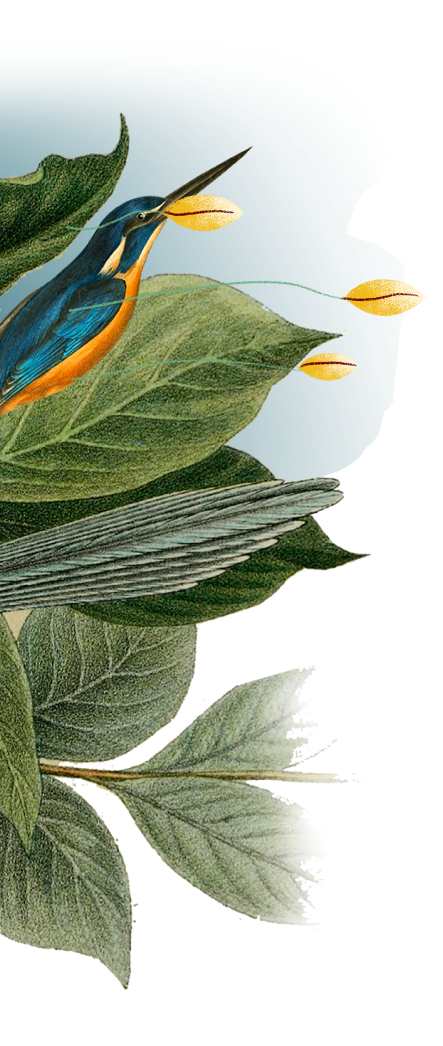
Media Inquiries
For media inquiries around this campaign, please get in touch with the communications team:



